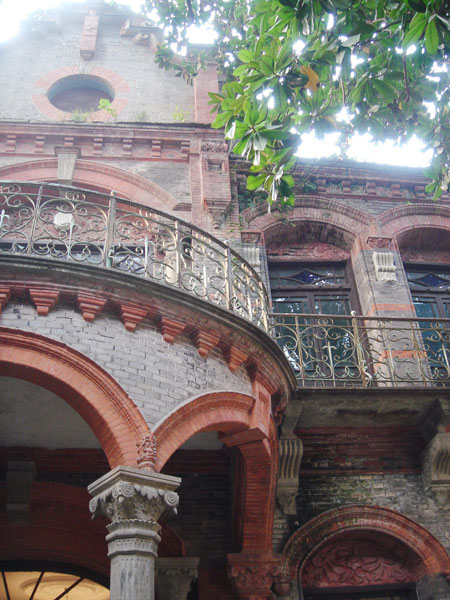A head of steam
Updated: 2013-06-20 03:10
By Raymond Zhou (China Daily)
|
||||||||
|
 |
|
Lianshi is one of the small river towns along the Grand Canal. Raymond Zhou / China Daily |
Like all small towns in this area, there are several stone bridges, and rows of households flank the river. Between the first bridge and the second one lies the stretch of water where my buddies and I used to swim in summer. (To stop you from any idyllic visualization, I'll add that the river also served as the kitchen sink, the laundry basin and the source of drinking water, after being boiled of course. That was before we had tap water.)
I always envied my buddies who lived right along the river. They usually had the sitting room facing the street, the kitchen in the middle and the bedroom facing the water. As such, they could clean the wooden floor of the bedroom by pulling up water from the back window and pour it onto the floor, as riverbank pillars support this part of the house. The rooms would be so spotless we kids could roll around and get no stain at all.
Also, in those days, there were more activities on the river than on the street. Most boats were rowed by hand. When two boats passed each other, someone would shout "pull the paddle" (banshao) or "push the paddle" (tuishao) and they always miraculously avoided collision, not even a scratch against each other during my years of river watching.
Most boats were used for transporting goods. Occasionally, there was a boat that was essentially a floating abode. The whole family would live on it, with a stove and smoke billowing out during mealtime. I'd always notice a kid, smaller than I was, playing on the stern.
Of course, I envied them for the squeaky clean wooden floor and for the ability to go places. My parents would chide me, saying those boat people were among the poorest. "They don't have even electricity."
I never got to know a single boat family in person. We were townsfolk, guaranteed by the household registration system, and those people had to be peripatetic with no place to call home — except their boat.
There was one family though, a mother and a son around my age, living on the outskirts of the town. They lived in a mud hut, obviously unable to afford a brick house. And they didn't talk to anyone. They were refugees from the north, I heard, and they never fit in. I guess the boat people would be like them if they tried to settle down somewhere.
There used to be bountiful fish in the tributary. One day, someone driving an engine-powered boat speeded by with an electric rod. Soon, dead fish, large and small, popped to the surface.
"What a clever idea to catch fish," people said.

 Michelle lays roses at site along Berlin Wall
Michelle lays roses at site along Berlin Wall
 Historic space lecture in Tiangong-1 commences
Historic space lecture in Tiangong-1 commences
 'Sopranos' Star James Gandolfini dead at 51
'Sopranos' Star James Gandolfini dead at 51
 UN: Number of refugees hits 18-year high
UN: Number of refugees hits 18-year high
 Slide: Jet exercises from aircraft carrier
Slide: Jet exercises from aircraft carrier
 Talks establish fishery hotline
Talks establish fishery hotline
 Foreign buyers eye Chinese drones
Foreign buyers eye Chinese drones
 UN chief hails China's peacekeepers
UN chief hails China's peacekeepers
Most Viewed
Editor's Picks

|

|

|

|

|

|
Today's Top News
Shenzhou X astronaut gives lecture today
US told to reassess duties on Chinese paper
Chinese seek greater share of satellite market
Russia rejects Obama's nuke cut proposal
US immigration bill sees Senate breakthrough
Brazilian cities revoke fare hikes
Moody's warns on China's local govt debt
Air quality in major cities drops in May
US Weekly

|

|








